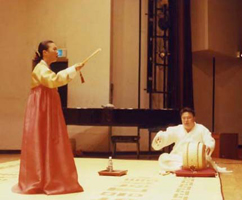
Vocal Music IV
P´ansori, "Story-Singing"
The story-singing tradition of p'ansori is an interesting Korean musical and literary journey: from the oral culture where it was created to the technology-based modern age. It started as humble marketplace storytelling. Entering the nineteenth century, despite the Neo-Confucian persecution of performance and performing artists, p'ansori became a preferred entertainment with support from many prominent royal and aristocratic patrons including Emperor Kojong (1852-1919) and his father Regent Taewôn´gun (1820-1898).[24]For more details and anecdotes, read 'Singers and Patrons' in Chan E. Park, 60-72.
In order to adjust to the rising expectations of patrons and audiences, the singers, in collaboration with interested literary scholars, revised the existing p'ansori narratives to be worthy of the newfound venues. Sometime during the nineteenth century p'ansori reinvented itself as the "five-narrative" canon grounded in the teachings of five Confucian cardinal virtues, i.e., filial piety, wifely chastity, sibling order, loyalty for your master, and gentlemanly honor and friendship.[25]The synopses of the five narratives are included in Chan E. Park, 6-11. Toward the latter part of the nineteenth century, women began to train in p'ansori. At the threshold of the twentieth century, the masters of the musical theatre of p'ansori were leading the modernization of Korean drama and theatre, but soon were met by new dramatic, literary, and musical trends entering en masse from West. The fact that Japan colonized Korea (1910-1945) further hindered Koreans´ construction of cultural and performance identities in this turbulent time. In 1963, p'ansori was designated as Korea´s National Intangible Cultural Asset No. 5 to be protected from extinction, and was designated by UNESCO as world oral heritage in 2003.
P'ansori
P'ansori singing typically utilizes three melodic modes: sad (kyemyônjo), magnanimous (ujo), and peaceful (p'yongjo). Demarcated by the Sômjin River that flows through the hills and plains of Chôlla province, there exist some stylistic differences between sop´yônje, "western school of singing" west of the river, and tongp´yônje, "eastern school of singing" east of the river. In comparison, the former utilizes more sadly drawn out modes, while the latter is built on more strident modes. In performance, the role of the drummer is important in that he supports, times, and helps energize the singer with drumming and exuberant ch'wimsae, "cries of encouragement." P´ansori utilizes seven or eight different rhythmic cycles introduced earlier in connection with sanjo. The ideal vocal quality is typically husky, unadorned, sincere, and emotive. Included here is an excerpt from Sugungga, Song of the Underwater Palace:
Composer: 0
-
"Sugungga, Song of the Underwater Palace"
SONG OF THE UNDERWATER PALACEThe Dragon King of the Underwater Palace is bedridden with a grave illness, and all the medicine in the world cannot cure him. One day, a Taoist monk descends from the sky to tell him that his only cure is a hare´s liver. None among the members of the king´s aquatic cabinet has the courage or integrity to venture to the land to find a hare for the king except loyal Pyôlchubu the Turtle. With a freshly painted portrait of the Hare folded and inserted deep in the fold of his neck, Pyôlchubu exits the Underwater Palace out to sea. After many life-threatening hardships, Pyôlchubu finds a hare and by hooks and by crooks succeeds in luring him to the Underwater Palace. Arriving at the palace, the hare realizes he has been tricked. Gathering his wits together, he tells the Dragon King that he regrettably left his liver in his mountain dwelling and needs to go back for it. Desperate for survival, the Dragon King orders Pyôlchubu to take the hare back to the land. Pyôlchubu is no fool, but he would not dare contradict his king. Landing safely, the hare insults Pyôlchubu profusely before hopping away. In his flighty celebration, the hare lets himself get caught again, this time in the grip of an eagle. Again, the hare outsmarts his captor and survives. Meanwhile, Pyôlchubu´s loyal heart moves Heaven, and he is awarded with the heavenly medicine with which to cure his king.





Trot (Teuroteu) is the oldest type of Korean pop music originating during Japanese rule in the first half of the 20th century.





